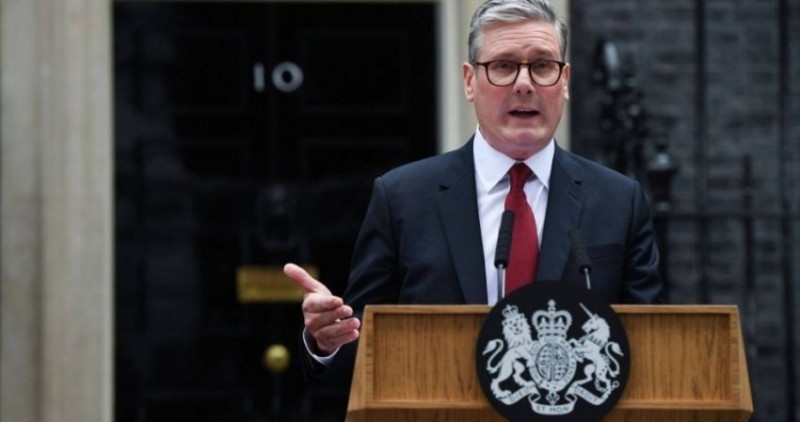
LONDON – Keir Starmer, Britain's new Prime Minister, began his tenure on Friday by engaging with world leaders and appointing his cabinet following Labour's landslide victory, which ended 14 years of Conservative rule.
Starmer appointed Rachel Reeves as the U.K.'s first female finance minister and named David Lammy as foreign secretary. This marks the first time a center-left Labour leader has held the prime minister position since Gordon Brown in 2010.
As crowds of Labour supporters celebrated outside Downing Street, Starmer promised to "rebuild" the U.K. after King Charles III invited him to form a government.
"The country has voted decisively for change, for national renewal, and a return to public service," Starmer said in his first speech as prime minister. "The work of change begins immediately. We will rebuild Britain."
Starmer quickly connected with global leaders, reaffirming support for Ukraine in its conflict with Russia in calls with Ukrainian President Volodymyr Zelenskyy and U.S. President Joe Biden. He also spoke with European Commission President Ursula von der Leyen, the prime ministers of Canada, Italy, Ireland, and Poland, and the heads of Scotland, Wales, and Northern Ireland.
German Chancellor Olaf Scholz expressed confidence in Starmer's ability to be a "very good, very successful" prime minister during their call.
Earlier, a somber Rishi Sunak conceded defeat after a challenging night for the Conservatives, which saw the loss of 12 senior cabinet members and former Prime Minister Liz Truss. Truss's brief and troubled tenure had significantly impacted the party's public standing.
Before leaving Downing Street, Sunak apologized to the public and announced his intention to step down as Conservative leader once a successor is chosen. The Conservatives' previous worst election result was 156 seats in 1906. Former leader William Hague described the recent results as "catastrophic in historic terms."
By late Friday, Labour had secured 412 constituencies in the 650-seat House of Commons, leaving only one result to be declared and giving them a majority of 174 seats. The Conservatives won just 121 seats, the lowest in their history, partly due to Nigel Farage's Reform U.K. party, which gained five seats.
The smaller Liberal Democrats ousted the Scottish National Party as the third-largest party. This shift contrasts with trends in other Western countries, where far-right movements are gaining traction.
Outside London's busy Waterloo Station, 49-year-old Ramsey Sargent called it a "momentous election," expressing optimism for the future.
Tim Bale, a politics professor at Queen Mary University of London, noted that while the Conservative loss was severe, it was not as devastating as some had predicted. The party must now strategize on how to recover.
Brexit champion Nigel Farage has openly aimed to lead the Conservative party, emphasizing a need to fill the gap in center-right politics.
Labour's resurgence is significant compared to five years ago when Jeremy Corbyn led the party to its worst defeat since 1935. Starmer, who took over in 2020, has steered the party back to the center and resolved internal conflicts.
Consistent opinion polls had placed Labour 20 points ahead of the Conservatives since Truss's resignation, making Labour's victory seem inevitable. However, as the count concluded, the gap was around 11%, with Labour winning fewer votes than in 2019 due to lower turnout.
Starmer faces numerous challenges, including slow economic growth and strained public services. He has vowed to restore political integrity after a turbulent period of five Conservative prime ministers in 14 years marred by scandal.
Read More: